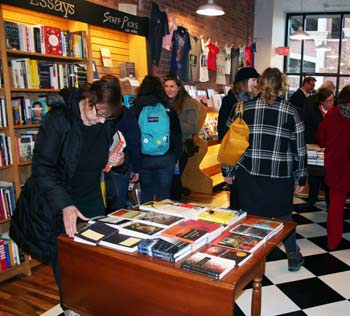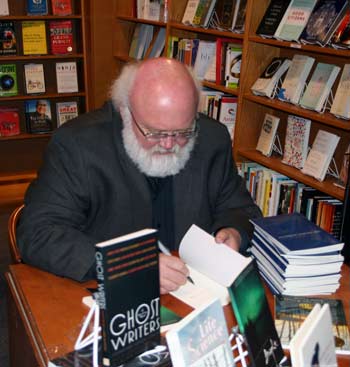Column: Literati’s “Moment on the Page”
In the depths, it is tough to have faith that all things must pass.
I have been cobbling together a living since July 2009, when New York-based Advance Publications shut down Ann Arbor’s daily newspaper. It was a trauma, pure and simple, for me and for many of my colleagues. After almost 20 years at The News and 30 years as a newspaperwoman, my “career” was dead and the newspaper industry eventually would be, too – at least as we knew it. Some really bleak months followed for all of us.

A crowd showed up for Literati’s first event on Friday evening, April 5. The new downtown bookstore is located at Washington and Fourth Avenue.
One of the ways I pay the mortgage now is with earnings from my freelance editing business. One of my clients was the Michigan Theater, which in 2011 hired me to edit a history of the theater. The manuscript’s author, Henry Aldridge, recently retired from the faculty of Eastern Michigan University; in the 1970s he rallied the community to rescue the Michigan from the wrecking ball and for decades has been one of the theater’s organists.
Over a number of months Henry and I would meet at Biggby Coffee on East Liberty Street and, chapter by chapter, shape his story of how a movie palace built for silent films in the 1920s weathered dramatic shifts in the film industry and the damage done to downtown America by postwar suburban sprawl, to ultimately stand firm as an Ann Arbor cultural landmark. It is an inspiring tale.
After one of our sessions we stood together outside Biggby and glumly beheld the dead sidewalk in front of the newly vacated Borders flagship store – a community institution that the community could not save. The ironies did not escape us.
The loss was especially personal for Henry; the bankruptcy had thrown a young friend of his out of a job she adored. Shannon Alden was a 14-year veteran of Borders with a passion for children’s literature. Henry was prodding her to find another way to use her gifts for connecting with people and sharing her delight in books. He urged me to contact her if only to offer some moral support; both of us had taken a hard blow to our sense of purpose because of a revolution in the economics of reading. Newspapers, bookstores – the Internet was killing them both.
So it is not a little ironic that months of blogging and Facebooking kept us up to date on the city’s much-anticipated new downtown bookstore before Literati officially opened its doors at 124 E. Washington St. on Easter Sunday.
From Blog to Bricks-and-Mortar
Literati Bookstore has come into being thanks to a huge commitment from Hilary Lowe and Michael Gustafson, partners in life and business. It was exciting to see good things start to happen in the space formerly occupied by Rick Snyder’s local campaign headquarters (cue the speculation about karma). I popped in a few times this winter – one day to discover the shelves had gone up, another to observe a woman with a paint roller risking her life atop a ladder placed just so on the stairs leading to the lower level. I met Lowe and Gustafson in the flesh on an afternoon in mid-March. It was a landmark day, too – the scanning of books had commenced!
From a short distance, I spied a stack of copies of “King Leopold’s Ghost” by Adam Hochschild, a really good book about some really awful history. It was then that I got that oh-my-god-it’s-really-happening jolt – an admittedly weird response to the rape of the Belgian Congo. Lowe talked about the 100-some job applications they’d received, with Borders and Shaman Drum alumni heavily represented. She was gratified to have had such a deep pool of available talent from which to choose a staff of a half-dozen or so “book ninjas.” And she (accurately) forecast an end-of-month soft opening.
Out of town for Easter, I paid my first visit to Literati the following Wednesday. The sun shone, but a sharp wind bit at my cheeks and bare hands that April morning as I made my way up Washington Street. I knew what I was looking for: “The Yellow Birds” by Kevin Powers and “Nothing Gold Can Stay: Stories” by Ron Rash. What I found as well was a beautiful space, with quirky vintage tables, chalk-on-blackboard signs and lots of natural light through windows that open on both Washington Street and Fourth Avenue.
Right off the bat I snagged a copy of “The Ancient Murrelet” fresh out of the box – Lowe was unpacking copies of poet Keith Taylor’s new chapbook in advance of his reading at the end of the week. I browsed the fiction, poetry and periodicals filling two long walls on the street level. Downstairs is dim and cozy – that morning a quartet of readers sat around a table, their heads bent … over books, not iPhones! At least a half-dozen customers were checking out the long wall of biography, history and political science and small sections for art, travel, health, gardening, photography and more. Lowe credits Peter Roumanis, an owner of the new Vellum restaurant on Main Street, for guidance in curating the exceptional cookbook selection.
Back upstairs, I resumed my search for “The Yellow Birds” – the author’s name had momentarily fled my head. I glanced around for some help and there, shelving books in the nook devoted to kid lit, was none other than Shannon Alden, one of the select Literati book ninjas! Up until that moment we were merely warm acquaintances; now we threw our arms around each other.
She located “The Yellow Birds.” The Rash collection was on the shelf, right where it belonged. “I Could Pee on This: And Other Poems by Cats” – on display near the register – was the perfect housewarming gift for Elvis, my stepdaughter’s kitty, from my own cats Lily and Clementina. Lowe identifies herself as a “crazy cat lady” but you’d know it anyway from a casual look at her shelves. (“Crafting With Cat Hair”? Thursday’s my birthday, friends.)
Shannon handled my purchases. “Of course, you’re going to be a frequent buyer,” she said, signing me up. Another customer was leaving with a big bag of books and some parting advice: “Stay open late during SummerFest; unbelievable crowds.” Then she eyed Shannon: “I remember you!” Another Borders alum, it turned out.
So there we were, in our new downtown bookstore: Shannon back to selling books and me back to buying them. After nearly four years of pinching pennies, I was in the position to spend $77.26 that morning, and another fifty bucks the night of Taylor’s reading. If you don’t think that’s a big deal, then lucky, lucky you. Now get your fortunate self down to Literati today and match it. And then do it next month, and the month after that.
$$$$$$$
I guess it’s not surprising that this last selection in Taylor’s new book of poems resonated:
In the Hard Months
Oh, I wish I could believe
in February that the blood root
will really bloom – for its short moment,
until its petals will be knocked
off by a cold rain – in March,
or that the cone flowers will turn
to seed in September so the finches
can pick them apart in one last
frenzy of summer, or that the poem
will come again, confident
and supple in its moment on the page.
Lowe and Gustafson report that they got lots of generous advice from local book lovers and booksellers, including Taylor – “one of the very first people we met with when we first told some people we were planning on opening a bookstore downtown,” they blogged. “Since then, he’s been incredibly supportive.”
But back in the summer of 2011, he wasn’t optimistic about the future of bookselling in Ann Arbor. Talking in the wake of Borders’ demise, Taylor said he wasn’t sure the local “book culture” was robust enough to support a new independent bookstore and fill the void left by the closures of Borders and of Shaman Drum, in 2009.

Poet Keith Taylor signs copies of his new chapbook, “The Ancient Murrelet,” at his April 5 reading at Literati Bookstore.
What would it take to make a go of it? For starters, he said, “idealism, a lot of 80-hour work weeks, a willingness to be constantly present.” Obviously, Lowe and Gustafson bring all that in abundance. But Literati’s owners are doubtlessly bringing a lot of debt, which brings us to the big issue: They’ve got to make the rent. Even if Faramarz Farahanchi might be the “landlord willing to rent space for less than the going rate” – for Taylor, that’s the bottom line – Literati has to sell a lot of books, every day.
Seasons change by themselves, provided we stay out of the way. Other welcome arrivals need help. Taylor’s poems have their moment on the page because he has a gift – and because he holds up his end of the bargain and takes to pen and paper with some regularity. The Michigan Theater still stands because Henry Aldridge and others like him knew its glorious worth and worked hard and smart to save it. I’ve got money to buy books again not only because of an indecent amount of luck, but because, most days, I show up at my desk.
I ran into Jill Peek, editor and publisher of “The Ancient Murrelet,” in the big crowd for Taylor’s reading on April 5. She observed that Lowe and Gustafson have not only taken a huge financial gamble, but they’re devoting some of the most crucial years of their professional lives to the experiment. A few days later we continued the conversation. “I hope I wasn’t too preachy with my remarks about risk,” she wrote in an email, “but I often feel that in this town, those with UM or institutional affiliations do not necessarily see that what’s new and lively often requires risk-taking. That’s my observation from growing up in what became Silicon Valley.”
Precious time and lots of money – the owners of Literati Bookstore are investing both and we have an obligation to do more than sing their praises for it. They are not going to succeed just because we’re deliriously happy that they are finally here – that Ann Arbor once again has a place downtown where we can go to readings and hold book club meetings and browse while we’re waiting for a table to open or the movie at the Michigan to start. That’s all great, but unless lots of people spend money there, often, it will not survive.
Being an engaged and beloved member of the community is simply not enough.
About the writer: Domenica Trevor lives in Ann Arbor – her columns are published periodically in The Ann Arbor Chronicle. The Chronicle relies in part on regular voluntary subscriptions to support our columnists and other contributors. If you’re already supporting The Chronicle, please encourage your friends, neighbors and coworkers to do the same. Click this link for details: Subscribe to The Chronicle.





Thank you for this lovely essay. I was so pleased to read of the intersection between Jill Peek (a small local publisher who is also a superb gardener) and Keith Taylor (whom I heard on NPR the other day, reading the poems of others).
Not mentioned here is that Joe Gable the Fable(d) former Borders Bookstore manager reputedly helped with the layout and arrangement in the bookstore. We visited for the first time during FestiFools and true to tradition, I bought a book I had not been thinking about, just because it was there looking at me. That’s the way it always used to be at the real Borders.
It’s a wonderful store and this is a wonderful essay! I have to confess that I stopped buying new books when Borders left town but I am happy to do so again (I kept shopping at Aunt Agatha’s and other used book stores). Like Vivienne, I bought a couple of books that I hadn’t planned on! Isn’t that part of the magic of a place like this?
I dropped by on my way to the library and ended up buying the book I had intended to borrow. I really hope this place can last.
Beautifully written, Domenica!
Why would you publish such a wonderful article about”Ann Arbor’s new downtown bookstore needs much more than just supportive statements to survive” but not include its address and phone number?
Katherine, the address is included in this paragraph of the introduction, which also provides a link to the website with additional contact information:
The address and link to Literati’s website is right there in the article, at the end of the first section.
Oh, sorry, I didn’t see Mary posted a response before mine.
A beautifully written and inspiring article, Domenica Trevor. Thank you, thank you!
Borders is nice but still has the face of corporate America written all over it. These two have strong and independant Michigan roots. Literati is the bookstore you Wolverines deserve, if you can keep it.
Lovely column Domenica. You knocked it right out of the ballpark. I miss having our daily coffee together at 5 a.m. in the newsroom of The Ann Arbor News. Great memories.